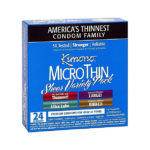Every few weeks, Dr. Vanessa Cullins, a board-certified obstetrician/gynecologist and vice president for medical affairs at Planned Parenthood® Federation of America, will be answering your questions here. To ask her your own question, click here.
Dear Dr. Vanessa,
My girlfriend has HSV 1 (herpes simplex virus 1) genitally but hasn’t had an outbreak in over a year. What risks am I looking at in terms of performing oral on her and/or having intercourse? Is it something that is easily passed along, even though HSV 1 normally occurs orally? I REALLY appreciate any info you can give.
— Confused
Dear Confused,
Please relax a little about this. Genital HSV 1 infections are not as persistent or infectious as genital HSV 2 infections. They are much less likely to become active again. This means that they are much less likely to cause recurrent outbreaks. It also means that few, if any, of the women and men with genital HSV 1 will need medical treatment to prevent recurrences because they happen so infrequently.
As you are aware, herpes simplex virus (HSV) has two forms. HSV 1 is the type of herpes virus that usually appears on the mouth, but it can also appear on the genitals and buttocks. HSV 2 is the type of herpes that usually appears on the genitals and buttocks, but it can also appear on the mouth. HSV 1 can be passed from the mouth to the genitals during oral sex. HSV 2 can be passed from the genitals to the mouth during oral sex. Today, up to eight out of 10 adults in the U.S. have HSV 1. About one out of six have HSV 2.
Genital HSV 1 infections are much less likely than genital HSV 2 infections to shed when there are no symptoms. This means that between outbreaks, infecting a partner with HSV 1 is less likely than infecting a partner with HSV 2, so the uninfected partners of people with HSV 1 have considerably less to worry about. And finally, men are generally less likely to have troublesome recurrences of genital HSV 1 than women, so men are at less risk of discomfort if they do pick up the infection.
This all adds up to two important points. The first is that sexually active people are all at high risk for herpes infection at some time in their lives, unless they only have one partner who only has sex with them and who is not infected (remember, condoms don’t provide complete protection from herpes). So it’s a good thing that herpes is not as serious or as dangerous as HIV. For most people, the outbreaks are very uncomfortable and can be very upsetting. But they usually diminish over time and do not have long-term effects on a person’s health and well-being.
The second point is equally important. It is very helpful for people who want to manage their herpes infections to have a precise diagnosis that tells them what type of HSV is affecting them. This will help them and their healthcare providers decide what kind of medication they may need and what, if any, safer sex steps to take to reduce the risk of infecting their partners.
Best wishes for continued good sexual health,
Vanessa
Planned Parenthood
Vanessa Cullins, MD, MPH, MBA, is a board-certified obstetrician/gynecologist and vice president for medical affairs at Planned Parenthood® Federation of America.


















I recently had a harrowing 3-week primary outbreak passed to me from oral sex – the guy takes his sexual health very seriously, and has tested clean for HSV 1 and 2 before and never had symptoms. Just know all it takes is kissing people to get a strain and then pass it on to someone else in the genital area through oral sex- symptoms or not! (we used a condom during intercourse so oral was most likely the culprit)
Hi Dr. Vanessa, my question is for the vice versa. If my boyfriend has HSV1 orally, what is the likelihood of me contracting genital HSV1 when there is lack of outbreak?
People have millions and millions of ganglia. Even if infection with one type of HSV protected affected ganglia against infection by another type of HSV — which may or may not be true — there would be many more unaffected ganglia, which would remain uninfected and susceptible to infection by either type. So affected ganglia offer little overall protection against further infection.
On the other hand, infection with one type of HSV offers some immune protection, which may reduce the seriousness of the symptoms of infection with another type of HSV. The level of that protection is unclear, however. So people who have HSV 1 should know that they are risk getting for HSV 2.
I believe that the nerve ganglia can only be infected with one sort of HSV, so HSV 1 infection would effectively prevent HSV 2 infection in the same ganglia. Would this not be a hidden benefit? Thank you for your answer. Candice
Herpes, schmerpes. If I was really into a woman I’d chance it.